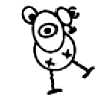Attributes: God of the crossroads, singer, warrior, jester, guardian of the door to the world of spirits. He often appears as a child or a crippled old man.
Sacred places: The crossroads of the world
Day: Monday
Colors: Black, red
Number: Three
Favorite food: Sweets, maize, and rum
Planet: Mercury
Ritual place in the house: Behind the door
Salutation: Ago Ellegua
The worship of Legba has its origin in Dahomey, present-day Benin. There, Legba was seen as a radiantly beautiful, young god and, therefore, he was often pictured with the cosmic phallus, a symbol of his life-conferring attributes.
In the Haitian Voodoo cult, Legba is worshiped in both his contrasting incarnations: the child, and the crippled old man, walking with a cane. In both incarnations, Legba is quick and unpredictable. He is regarded as a trickster and as a personal messenger of fate. As a child, he is rebellious; as an old man, wise. In some myths, he also portrayed as a thief, because he is said to have stolen some divine secrets and revealed them to human beings.
According to legend, he is the youngest son of Lisa and Mawu. Lisa is the sun god who brings the day and the heat, and also strenght and energy. Mawu, the moon goddess, provides the cool of the night, peace, fertility, and rain. Thus, Legba combines all these attributes, and in his role as god of fate, he can bring great fortune but also unspeakable sorrow to man.
Every ceremony begins with his invocation and ends with his dismissal. It is only through contact with Legba that it becomes possible to contact the other gods, for he is the guardian at the door of the world of spirits. During an invocation, he mostly appears as the messenger of another god, translating the words of the supernatural into the language of humans.
The holy center of each Voodoo temple is a column decorated with consecrated signs. It embodies the cosmic channel through which communication with the world of the spirits becomes possible. Legba is the guardian of this bridge between worlds, which also connects the place of the living with the realm of the dead. Therefore, with Legba's consent it is possible for the dead to return to the world of the living. Ghosts of these ancestors return either to preotect their families, or to take revenge if they have been neglected.
Legba's veve is sketched on the ground at the beginning of every ceremony. In Haiti, it includes the symbol of a crutch. His invocation is sung by the participants in unison:
Atibon Legba, opet the gate for me.
Papa Legba, opet the gate for me.
Open the gate that I can enter.
God Legba, open the gate for me.
When I return, I will thank the Loa.
Abobo!
Meanwhile, the Voodoo priest runs again and again to the door to symbolically open it, until finally Legba takes possession of one of the people present. then it is said that the Loa „rides“ him. The person possessed by legba takes on the appeareance of an old man, twisted in such a way that he is indeed temporarily crippled. In this manner, Legba demonstrates the terrible strenght he posseses, despite his appereance as a weak, old man.
After Legba has manifested himself in this way, the other gods can be called.
Legba's altar is on the ground, in a box, or a closet behind the entrance to the house. He is supplied with food items that are associated with him, and also with fabrics and pearls in his black and red colors.
When a person turns to him, Legba is first greeted with the ritual „Ago Ellegua!“ He is mostly called upon when the person seeking help has to make a decision and can no longer clearly see his course. The god can then lead him and open the way for him.


















» Love spell with menstrual blood
» Bacanje graha - zavirimo malo u sudbinu!
» Sanovnik - tumačenje snova
» Velike čarolije sa nožem
» PAGANSKI/VJEŠTIČJI TALISMANI I AMULETI (Bosnian/English)
» Solju protiv magije
» MAGIC FOR EVERY WITCH
» Molitvom i svijećom uklonite zlo i lošu sreću